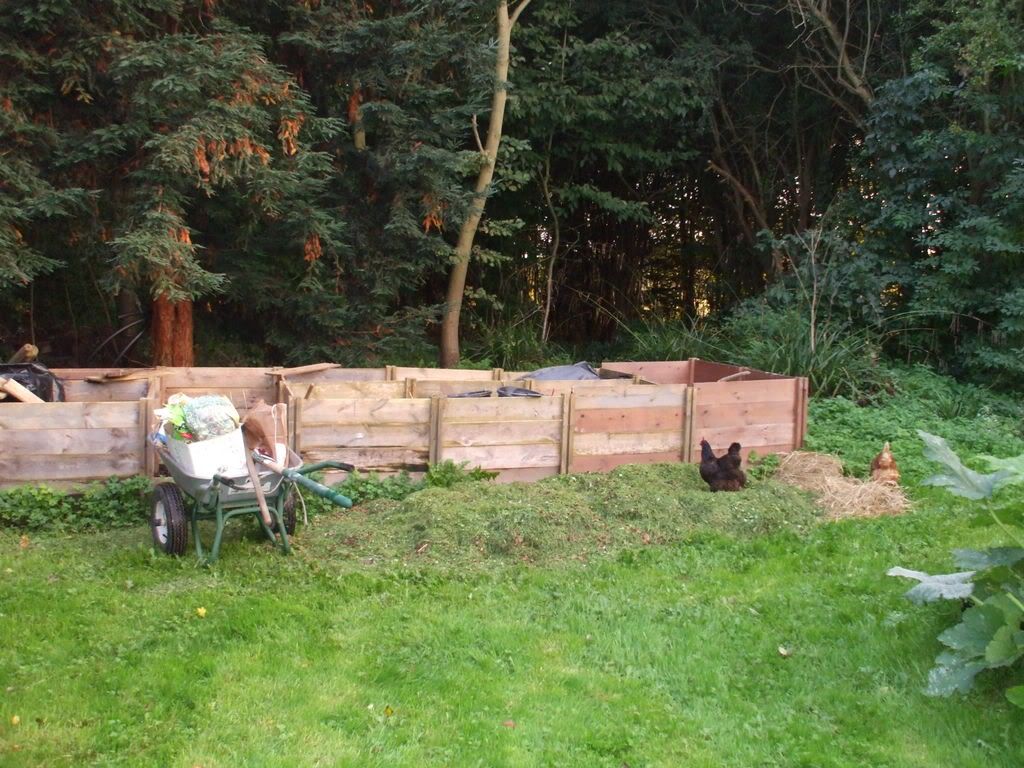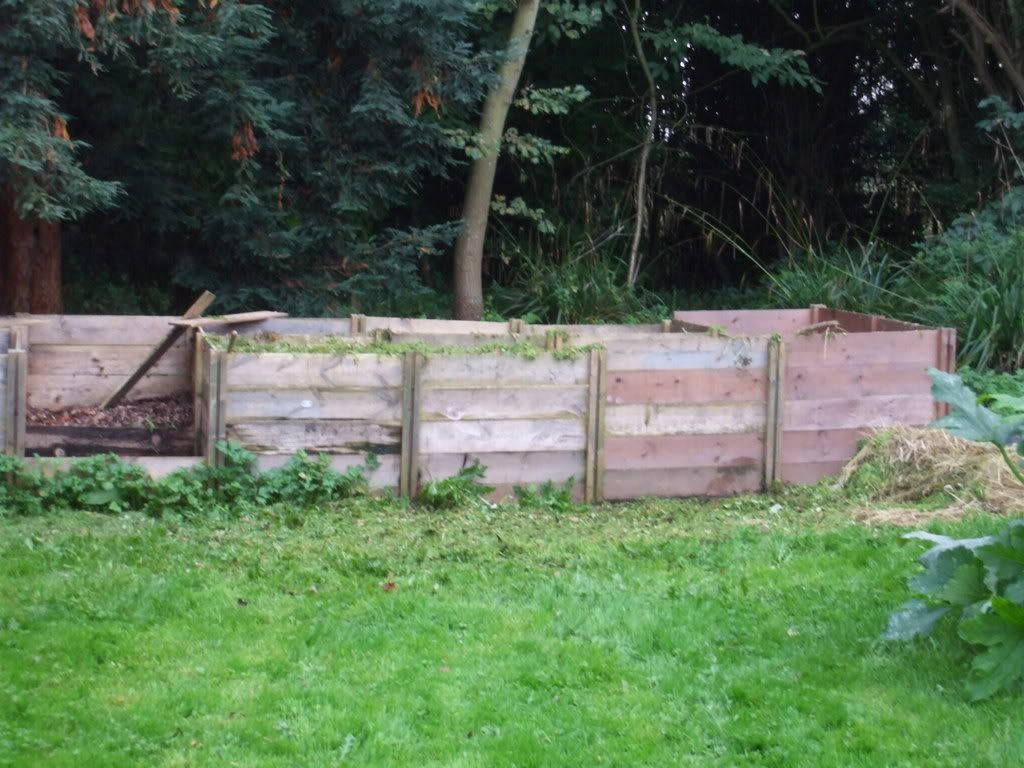 As a result of all the problems over the contamination of manure with Aminopyralid herbicide residues this year, a lot of people have asked me how they can avoid this kind of issue and how they can maximise the amount of home made compost they can make.
As a result of all the problems over the contamination of manure with Aminopyralid herbicide residues this year, a lot of people have asked me how they can avoid this kind of issue and how they can maximise the amount of home made compost they can make.Compostman and I make more than 4000 L of compost a year plus whats cooking in the bins...AND we have loads of grass clippings I can use as mulch ( mainly because I feel I have enough compost bins already )
and *I* still was buying in a few bags of "Organic" Peat Free compost, to grow seeds etc, and I guess lots of other people who make lots of compost do the same, and get manure in.
 I will continue to use lots of cardboard/paper to cover my plot when the soil is bare, to stop loss of nutrients and to provide some organic material as it rots down...I will also carry on mulching directly with grass cuttings on fallow soil, and planting green manures WHEREVER I can to promote fertility and add humus to the soil.....
I will continue to use lots of cardboard/paper to cover my plot when the soil is bare, to stop loss of nutrients and to provide some organic material as it rots down...I will also carry on mulching directly with grass cuttings on fallow soil, and planting green manures WHEREVER I can to promote fertility and add humus to the soil.....I will continue to use the comfrey and nettles I grow ( well which grow all over the place by themselves!) and add them to my compost heaps AND make fertiliser teas from them to feed my plants..(BTW Nettles are good BUT always make sure they are of known provenence!...else you might be back to importing herbicides AGAIN ! )
Grass cuttings and cardboard intermixed is VERY good...its called "Grassboarding" by CAT and if its only grass and cardboard, it makes a wonderful peat like compost....if you have a source of KNOWN UNSPRAYED grass you could mow for someone? so you could take the cuttings?
So... my advice? make lots of compost, don't buy in stuff from outside, if you do, get certified organic stuff,plant green manures, comfrey, nettles and MULCH...
I do all this already and it DOES work..but it takes a bit of time and effort...
AND be EVEN more careful about putting EVERYTHING you can compost into the compost bins, and start growing some extra plants to add bulk to it and gathering more stuff from other sources.
Conventionally ,the usual ways of maximising compost output would perhaps be getting a community compost system going in your neighbourhood, BUT it would need to be policed VERY rigorously to ensure nothing nasty went in the bin.... ( back to that pesky Aminopyralid issue again!)
and so we come back to the original issue...
How to maximise compost!
To get the ideal compost mix you will roughly need a 50:50 mix
of both "green" and "brown" material in your bin. A good place to get advice is the Home composting site from
http://www.recyclenow.com/home_composting
‘GREENS’
● Fruit scraps (including citrus peel)
● Vegetable peelings
● Tea bags
● Old flowers
● Spent bedding plants
● Rhubarb leaves
● Comfrey leaves
● Nettles
● Young annual weeds (e.g. chickweed and speedwell)
● Pond algae and seaweed (in moderation)
● Coffee grounds and filter paper
● Grass cuttings
● Manure (horse, cow, pig, sheep, goat, chicken, rabbit – not too much as could become too wet)
‘BROWNS’
● Tissues, paper towels and napkins (unless they have been in contact with
meat or disease)
● Tumble dryer lint (from natural fibre clothes)
● Old natural fibre clothes (e.g. woolly jumpers or cotton t-shirts
– make sure you cut them into small pieces)
● Vacuum bag contents(as long as you have natural fibre carpets)
● Garden prunings
● Toilet and kitchen roll tubes
● Woody clippings
● Dry leaves, twigs and hedge clippings
● Human and pet hair (slow to break down)
● Cotton threads/String(made from natural fibres)
● Feathers
● Wool
● Newspaper(scrunched up)
● Shredded confidential documents
● Straw and hay
● Vegetarian pet bedding
● Ashes from wood,paper, or lumpwood charcoal
● Sawdust and wood chippings
● Corn cobs and stalks
● Cereal boxes
● Corrugated cardboard packaging (scrunched up in small amounts)
● Pine needles and cones (although slow to compost don’t put too much in)
● Egg shells (but crush them first to speed up composting)
● Egg boxes
Some helpful leaflets are http://www.wrap.org.uk/downloads/EnjoyNewsletter2006.1dad7965.pdf
which is full of things you might not have thought of composting.
also the BGI factsheet on Home composting...http://www.thebiggreenidea.org/factSheets.cfm
I have found this post very helpful, making our own compost is on our list of projects.
ReplyDeleteGood! I am glad you found it useful...its THE number 1 question I get asked, as a Master Composter, when I do stands and shows and demonstrations!
ReplyDeleteThanks for those lists - we only manage to compost some of our grass clippings, although I do also use some as a mulch in the veg patch. We have now lost the place where we were dumping the excess so we really need to get all the clippings composted now. Plus of course it is such a valuable resource. Now I shall be building up a supply of suitable browns ready for next years grass.
ReplyDeleteRosie x